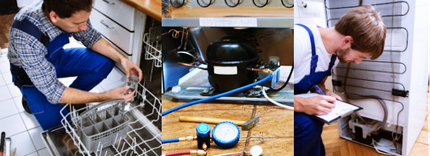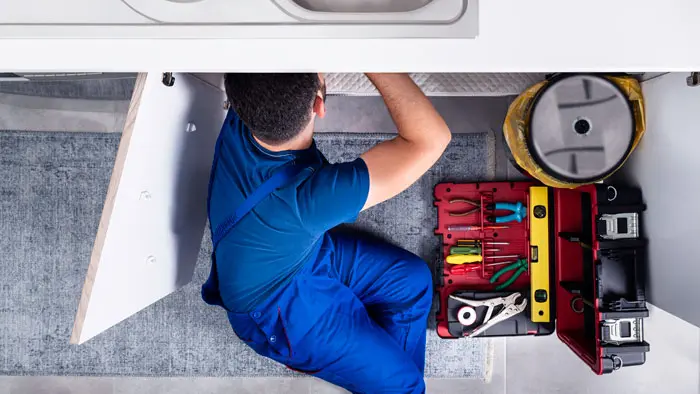The Ultimate Overview to Understanding Appliance Fixing at Home
When your fridge stops cooling down or your stove declines to heat, it can feel overwhelming. Understanding appliance repair service in the house can save you time and money. You'll learn to identify signs and symptoms, use necessary devices, and comply with a systematic troubleshooting procedure. Before you begin, there are vital security preventative measures you need to take into account. What are the most common issues, and how can you repair them? Let's check out the fundamentals.
Usual Home Appliance Troubles and Their Signs
When your home appliances begin breaking down, it's important to acknowledge the indications at an early stage. Neglecting them can cause bigger concerns and expensive repairs. For example, if your fridge isn't cooling correctly, you may notice cozy places or condensation forming. This could suggest a falling short compressor or an obstructed vent.Your dish washer might show issues with dirty dishes or unusual sounds throughout cycles. If you hear grinding or clanking, it's time to investigate.A cleaning machine that will not rotate or drain pipes can leave you with soggy washing, suggesting a stopped up drainpipe or a malfunctioning pump.Lastly, if your stove's temperature level seems off or it takes forever to pre-heat, you may be dealing with a damaged thermostat. By staying sharp to these signs, you can deal with concerns prior to they rise right into significant fixings.
Important Devices for Device Repair
When you're tackling device fixings in your home, having the right devices is necessary. Fundamental hand tools like screwdrivers and pliers will certainly aid you dismantle and fix various home appliances, while electrical testing tools ensure you're working safely with circuitry. Allow's look at what you need to get going on your repair service journey.
Standard Hand Devices
Having the right tools is necessary for efficient device fixing in the house. Start with a dependable screwdriver set, consisting of both flathead and Phillips kinds, as screws are common in home appliance setting up. Pliers are additionally essential; they assist with gripping, twisting, and reducing cables or small parts. A pair of needle-nose pliers can reach tight areas easily. You'll require an excellent flexible wrench for tightening up or loosening up nuts and screws. An utility knife comes in handy for puncturing packaging or insulation. Do not fail to remember a strong workbench or surface area to securely organize your tools and components. With these standard hand tools, you'll be well-prepared to deal with most device repair work that come your way.
Electrical Screening Tools
Together with standard hand tools, electric screening devices play a crucial role in appliance fixing. These tools help you diagnose electrical problems and assurance appliances function securely. A multimeter is important; it measures voltage, current, and resistance, permitting you to determine troubles swiftly. A non-contact voltage tester is another must-have, allowing you detect real-time cables without making direct call, enhancing your safety and security. Clamp meters are wonderful for gauging current flow in cords without detaching them, saving you effort and time. Additionally, circuit testers can quickly inspect if outlets are working correctly. By utilizing these devices, you'll streamline your troubleshooting procedure and boost your repair skills, making home appliance upkeep a great deal simpler.
Step-by-Step Guide to Diagnosing Appliance Issues
When your home appliance breaks down, it can be frustrating, but diagnosing the issue doesn't need to be frustrating. You'll find out to determine usual troubles and use efficient repairing methods. Let's go through the actions to get your home appliance back in functioning order.
Usual Device Problems

Repairing Techniques Clarified

Repairing Significant Kitchen Area Home Appliances: A Closer Look
Have you ever before wondered how to deal with typical problems with your kitchen appliances? Fixing significant kitchen area devices like fridges, ovens, and dishwashers can be easier than you assume. Beginning by determining the issue-- whether it's a refrigerator not cooling down or an oven that won't heat. Commonly, a straightforward reset or examining the power source can resolve the issue.For fridges, tidy the condenser coils and examine the door seals. If your stove's not home heating, examine the home heating aspect and thermostat. Dishwashers may just require a tidy filter or a reset to get them back at work. Constantly unplug the appliance before diving into repair work to guarantee your safety.Don' t neglect to get in touch with the user manual for specific troubleshooting suggestions connected to your design. With a little bit of patience and the right devices, you can with confidence take on device repairs and save money while doing so!

Repairing Laundry Equipments: Tips and Techniques
When your laundry devices begin breaking down, it can really feel overwhelming, but fixing them doesn't have to be a problem. Begin by checking the power supply. Verify the home appliance is connected in and the electrical outlet is working. Next off, examine the door or cover switch; a faulty switch can prevent the machine from operating.For washers, if it's not rotating, look for unbalanced tons. Redistributing the garments may fix the concern. If your dryer isn't heating, clean the dust filter and examine the air vent for blockages.Listen for uncommon noises; they can indicate a problem. If your appliance is dripping, examine the tubes for these details splits or loose links. Record any error codes shown on digital screens, as they can direct you in identifying the concern. Lastly, consult the user manual for details repairing pointers associated with your model.
Safety Preventative Measures to Take During Fixes
Prior to you start any kind of appliance repair services, it's important to prioritize safety and security to avoid crashes or injuries. Disconnect the home appliance or transform off the circuit breaker to ensure no power reaches it while you work. Use insulated tools to decrease the threat of electrical shock. Wear safety goggles and gloves to shield yourself from sharp edges or debris (Dependable Refrigeration & Appliance Repair Service Washer repair near me).Make certain your work space is tidy and well-lit, so you can see what you're doing. Keep youngsters and animals far from the area to avoid diversions and potential threats. If you're taking care of gas appliances, be additional careful; look for leakages before proceeding.Take your time, and do not rush through repairs. If you feel unpredictable concerning any kind of step, it's better to stop and research study than to think. Following these safety measures will certainly aid produce a safer atmosphere for your do it yourself appliance repair work task
When to Call an Expert for Assistance
Just how do you discover this know if it's time to employ a specialist for device repairs? If you've tried basic troubleshooting without success, it's a clear indicator. For circumstances, if your home appliance still will not begin or shows unusual noises after resetting it, don't be reluctant to seek specialist help.When you discover leakages, smoke, or shedding scents, focus on security and call a pro promptly. These concerns can cause even more significant damages or posture threats to your home.Also, if your device is under warranty, speaking to an expert is often the most effective path. They can guarantee that repairs won't void your service warranty, saving you cash in the lengthy run.Finally, if you're not sure or uneasy with complex repair services, it's wise to leave it to the professionals. Bear in mind, dealing with difficult concerns without the appropriate knowledge can bring about pricey blunders. Trust fund a professional when unsure!
Frequently Asked Questions
Just How Can I Stop Appliance Troubles in the Future?
To stop device issues in the future, you should execute normal upkeep, look for wear and tear, tidy filters, and avoid overloading. Staying proactive will certainly assist expand their lifespan and keep them running smoothly.
What Are one of the most Usual DIY Device Fixing Mistakes?
You may neglect safety and security precautions, skip troubleshooting steps, or make use of wrong tools when trying do it yourself home appliance repairs. Rushing the procedure or neglecting supplier standards can bring about even more substantial concerns and costly blunders. Remain patient and educated!
Just how Do I Know if a Component Requirements Substitute?
You can tell if a part needs replacement by examining for unusual noises, leakages, or inconsistent performance. If the device struggles to operate properly or reveals noticeable damages, it's most likely time for a replacement.
Can I Make Use Of Generic Parts for Home Appliance Repair Works?
Yes, you can utilize common components for device repair work, but establish they work - Dependable Refrigeration & Appliance Repair Service Washing Machine Repair. Generic components might save you money, yet they can influence efficiency or longevity, so evaluate your alternatives thoroughly prior to choosing
What Service Warranties Cover Home Appliance Repairs?
Many device warranties cover fixings for producing issues, however they typically exclude damage from misuse. Check your warranty terms very carefully, as some could require utilizing qualified specialists Full Article and original parts for protection to stay valid.